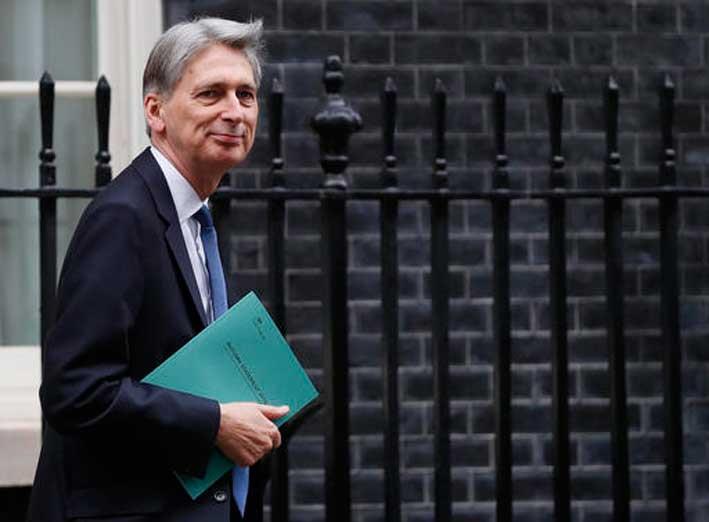Britain will have less money, more debt and a slower economy in coming years as it grapples with uncertainty over leaving the European Union, the Treasury chief said Wednesday in his first budget update since the 'Brexit' vote.
Philip Hammond delivered the economic statement to a less-boisterous-than-usual House of Commons as the country faces unease over the future and prepares to lock horns with the EU next year on its exit from the bloc.
True to his nickname of "spreadsheet Phil," Hammond offered dismal accounting: growth will be weaker than had been predicted before the vote and households and businesses should not count on the state's largesse.
Though Hammond could take some solace in the resilience of the British economy in the months following the seismic June 23 referendum, the future is uncertain. He said his goal was to get the economy "match fit" for the next chapter.

"The British people decided, exactly five months ago today, to leave the European Union and chart a new future for our country," Hammond said "That decision will change the course of Britain's history....We resolve today to confront those challenges head on."
Hammond soberly outlined the fact that government finances have tightened, leaving little room for spending increases that experts say would be needed to help the lower- and middle-income families that are struggling with previous agreed austerity measures.
"We will maintain our commitment to fiscal discipline," Hammond said in delivering the update, known as the Autumn Statement.
Despite that pledge, the uncertainty over the coming EU exit talks means the government will have to increase borrowing by 122 billion pounds ($150 billion) into the next decade.

Hammond offered a sweeping critique of the country's economic landscape, and placed particular emphasis on the need to improve productivity, pointing out that the Germans, the French and the Italians had better productivity rates. He talked about the challenge in providing enough housing and in the imbalance in economic growth from regions such as London and the southeast and the northern part of the country. Infrastructure investment is needed.
"He has correctly identified the long-term problems faced by the U.K. economy, and this Autumn Statement is a move in the right direction," Aberdeen Asset Management Chief Economist Lucy O'Carroll said. "But there isn't really enough money being spent here to solve these long-term problems - hardly surprising, perhaps, when there is so much uncertainty around Brexit."
The budget update set aside money for roads and digital infrastructure and emphasized investment in research and development.
Though the forecast for economic growth this year was largely unchanged around 2 percent, next year's was slashed from 2.2 percent to 1.4 percent, according to Office for Budget Responsibility, an independent body that supplies the predictions.

Over the next five-year period, the EU exit decision will cause growth to be 2.4 percentage points lower than it would otherwise have been, Hammond said.
For subsequent years, the outlook remains murky due to a range of uncertainties, including global factors like the election of Donald Trump to the U.S. presidency.
Hammond was under pressure to help working families that are threatened by welfare cuts planned under previously announced austerity programs.
He announced plans to help build affordable homes, increased the national living wage to 7.5 pounds ($9.30) an hour and banned upfront fees charged to those who rent their homes.
But some advocates for these people were disappointed.

"For all the talk, this was a rescue package for 'just managing' families that failed to turn up," said Alison Garnham, the chief executive of the Child Poverty Action Group. He said that Hammond had merely "applied a sticking plaster to family budgets hemorrhaging losses imposed on them by his predecessor's budgets."
Some 6 million working households fall into the "just about managing" category, with a net income of between 12,000 pounds and 34,000 pounds. The typical U.K. wage is 21,000 pounds ($26,000).
These are families who were struggling even before the 2008 financial crisis, and suffered further from the downturn.
Typical incomes are no higher than a decade ago, but housing costs are higher, according to data from the Resolution Foundation said. The difficulty is helping this group get into a position where they can stand on their own - as they often dip in and out of trouble, Whittaker said.
"Even people doing quote unquote 'the right thing,' find that they can't escape," said Matthew Whittaker, chief economist of the Resolution Foundation. "It's a shame that it has taken the government so long to notice."